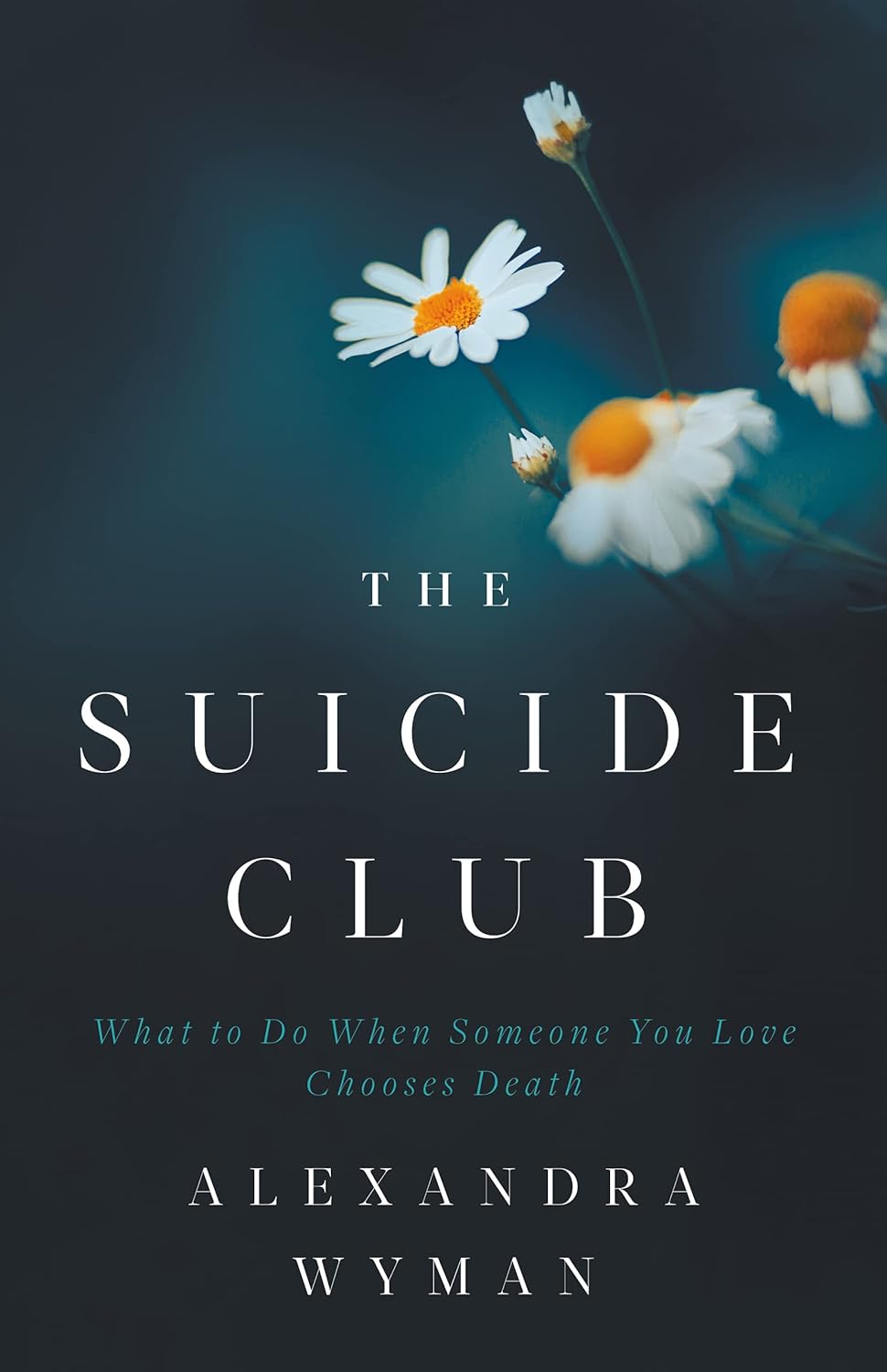The Suicide Club: What to Do When Someone You Love Chooses Death

How could you not wonder what you could have done differently when someone you love dies by suicide? How are you supposed to feel? How do you cope? The Suicide Club: What to Do When Someone You Love Chooses Death is Alexandra Wyman’s story of pain, struggling, and recovery.
“The day my husband ended his life was the worst day of mine,” says Wyman. It’s a common refrain that the pain the suicidal person carries doesn’t evaporate when they die. Instead, the pain is transferred to those who love them. Suicide doesn’t make it go away – it spreads it. It’s like hitting dog poop with the mower.
Immediate Reorientation
Wyman admits that her pre-event perspective on suicide was radically reoriented. She had to come to terms with her perspective that people who died by suicide were selfish and didn’t have their lives together. Her judgement of people who were suicidal was colored by society’s portrayals and perspectives on suicide. Shawn, her husband, died and forced a reevaluation of these beliefs. While not perfect, he was far from the person that she had in her mind of the suicidal person.
Others have shared that, the moment they lost someone to suicide, they had no choice but to reevaluate their relationship to it. Some respond with shame and keep the story of suicide quiet. A friend of mine lost her father. She shared that the family said it was a hunting accident. Her candid retort after that was, “but the only thing he was hunting was himself.” You allow such retorts for those who are grieving and angry.
The Long Reorientation
Some things take longer. Changing the relationship you have with the deceased isn’t easy. One moment you’re in a bidirectional relationship, with give and take; the next moment, you’re alone and talking to yourself – maybe even audibly. Therapeutically, many schools of thought encourage communication with people who aren’t there by writing them letters and through exercises involving two chairs, where you can take the place of the missing person.
While this extreme position isn’t necessary for the long term, the truth is that some part of the other person will stay with you. At some point, it may even feel like the presence of an old friend with whom you’ve lost touch with. It can be a warming and affirming voice reminding you that you’re doing well or celebrating your achievements.
One Decision from a Different Life
Mel Robins said, “You are one decision away from a completely different life.” The intent was to convey that your small decisions – go to college or start working, for instance – can radically change the course of your life. That’s true in my life. My world skipped the college experience and then returned to it; in that space, I found technical publishing, which taught me how to learn while working. My life would have been different had I been able to attend college immediately after high school.
However, those who have tragically lost loved ones due to suicide recognize a second meaning. The decision isn’t always yours. Sometimes, the decision that changes your life is one made by your loved one. Alex’s death radically reoriented the work that we’re doing and the way that I view the world. The life I have today is radically different from the one I’d have had if he was alive.
Obviously, the life is worse off in the loss, but it’s better, too, as we’ve met amazing people.
Compass
Rebuilding a life in the aftermath of death or suicide death is incredibly disorienting. The moment you believe you’re headed in the right direction, you get turned around – or knocked down. The theme song to the TV show, Cheers, includes the lyrics, “Making the way in the world today takes everything you’ve got.” That’s doubly true when you’re trying to navigate the world without a friend. The chorus includes “Where everybody knows your name and they’re always glad you came.” When your loved one dies, part of the “everybody” that knows your name dies.
If we’re lucky, we’re left with a compass – a mission. Whether we’re lucky or not, no one is left with a map of how to move their life forward in the absence of the one they lost. We’ve got to figure it out, get lost, and try to reorient.
We do have to continue life. In the case of the loss of a spouse, it’s appropriate to “move on” with a new romantic relationship recognizing that the relationship will include the person who was lost. There’s no competition. There’s no replacement. There must be acceptance that the missing person is a part of the past and the present – even though they are not physically present.
Life Happens for Us
It’s natural to think that life happens “to” us after a tragic loss. We can feel as if we’re out of control and the world is a hostile place. However, it’s also possible to relearn that life happens “for” us. It’s a journey that has both highs and lows. No one would want the lows of a death by suicide, but at the same time, we cannot have the good without the bad.
In an ideal world, we’d find our way back to the realization that life is a gift. Then again, it would be better if no one else would have to join The Suicide Club.
